

|
Diamond Geezer : An Appreciation of the work of Lawrence Block by Simon Kernick© 2004 Simon Kernick |
|
I first came across the name Lawrence Block in a musty second-hand bookshop near Londonís Kings Cross. It was the autumn of 1996, the weather was bad, and so was my mood. I was in a job I hated, my boss was putting a lot of pressure on me, and I needed something to lighten my load. Thatís the beauty of a good book. It helps you escape, and at that time escape was exactly what I needed.
As I perused the shelves of the crime section, a title jumped right out at me: A Walk Among the Tombstones.  As a writer, I canít tell you how hard it is to come up with a good title for a book - something eye-catching, original, and compelling - but this was it. I picked it up, saw that the author was someone I hadnít heard about, and started reading. It took me less than ten lines to know that I was on to something good. The dark, sardonic voice of unlicensed New York PI, Matt Scudder, dragged me straight into the story, his calm, explanatory words somehow making the bloody murder at the end of the first chapter far more shocking than it could otherwise have been. I immediately bought the slightly dog-eared copy, read it in one day, and finished it thinking that in Lawrence Block Iíd come across someone who tears up the rulebook governing the conventions of crime fiction, with stunningly impressive results. I was also hoping heíd written a few more books.
As a writer, I canít tell you how hard it is to come up with a good title for a book - something eye-catching, original, and compelling - but this was it. I picked it up, saw that the author was someone I hadnít heard about, and started reading. It took me less than ten lines to know that I was on to something good. The dark, sardonic voice of unlicensed New York PI, Matt Scudder, dragged me straight into the story, his calm, explanatory words somehow making the bloody murder at the end of the first chapter far more shocking than it could otherwise have been. I immediately bought the slightly dog-eared copy, read it in one day, and finished it thinking that in Lawrence Block Iíd come across someone who tears up the rulebook governing the conventions of crime fiction, with stunningly impressive results. I was also hoping heíd written a few more books.
And he had. Boy, he had.
Lawrence Block has been producing quality fiction - mainly, but not exclusively, crime - for close to forty years, and unlike some authors who reach the top of their game and find themselves letting things slip, he continues to produce work that has little equal. Itís not just me saying that, either. Heís won the Shamus (twice), the Edgar, and now the CWAís Diamond Dagger for lifetime achievement. Heís prolific, too. More than fifty novels to date, and countless short stories, so once youíve discovered him, youíve got plenty to keep you busy.
Blockís work has featured a number of interesting protagonists, from Keller, the cerebral hitman who likes to collect stamps, to Tanner, the Korean war vet whoís incapable of sleep and has spent twenty-five years in a deep freeze; but heís best known for his long-running series characters, Matt Scudder and Bernie Ďthe burglarí Rhodenbarr - the latter of whom was played so unmemorably by Whoopi Goldberg in the 1987 movie disaster, Burglar.
Bernie and Scudder are two very different sides of the Block coin, and demonstrate perfectly his versatility as a writer. Whereas the Burglar books tend to be light-hearted and gently humourous in tone, harking back to the cosy mysteries of Agatha Christie and Ngaio Marsh where a murder was simply an excuse for an entertaining whodunnit, Scudderís cases are as hard-boiled and gritty as they come, played out against the backdrop of the mean, unforgiving city. 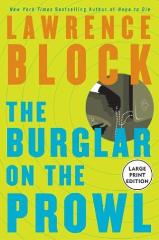 I enjoy reading the cheerful, slightly immoral fables of Bernie, whose penchant for liberating property from its rightful owners seems invariably to end with him stumbling across a murder scene and getting fingered for the crime, but my personal favourite of Blockís characters will always be Scudder, the one I discovered first. What I like most about the Scudder novels is that nothing is black and white. Cases are wrapped up, but never in a neat, sanitised manner. People suffer, and sometimes justice isnít always done. Every person involved in the intricate, carefully plotted works is tinged with grey. Scudderís lover is a former prostitute, now artist and real estate magnate, while his friends include men who operate well outside the law, such as the self-confessed killer and gangster, Mick Ballou. Such is Blockís skill at characterisation that even men like Ballou are effortlessly able to retain the readerís sympathy. Even Scudder himself has a certain ambiguity about him. Heís no squeaky clean hero. Heís killed people himself, and heís worked on behalf of some pretty dodgy individuals, including drug importers and blackmailers, but you still feel that heís on the side of natural justice. He has weaknesses, he has strengths, but most of all he has personality. In short, heís believable.
I enjoy reading the cheerful, slightly immoral fables of Bernie, whose penchant for liberating property from its rightful owners seems invariably to end with him stumbling across a murder scene and getting fingered for the crime, but my personal favourite of Blockís characters will always be Scudder, the one I discovered first. What I like most about the Scudder novels is that nothing is black and white. Cases are wrapped up, but never in a neat, sanitised manner. People suffer, and sometimes justice isnít always done. Every person involved in the intricate, carefully plotted works is tinged with grey. Scudderís lover is a former prostitute, now artist and real estate magnate, while his friends include men who operate well outside the law, such as the self-confessed killer and gangster, Mick Ballou. Such is Blockís skill at characterisation that even men like Ballou are effortlessly able to retain the readerís sympathy. Even Scudder himself has a certain ambiguity about him. Heís no squeaky clean hero. Heís killed people himself, and heís worked on behalf of some pretty dodgy individuals, including drug importers and blackmailers, but you still feel that heís on the side of natural justice. He has weaknesses, he has strengths, but most of all he has personality. In short, heís believable.
And he ages too, like Bernie. Like the city of New York. Block started writing the Scudder series in the mid seventies, a time when his PI was a young man in his thirties. The city was different then, and so was he. An alcoholic with a chequered history, and a family heíd as good as abandoned, Scudder cut a sad, lonely figure. But since then heís fought back against the bottle, grown wiser, lost some friends and gained others, found romanceÖ And always kept going, solving some brutal crimes in the process while entertaining a growing band of readers. Now well into his sixties, he shows no sign of letting up.
And nor does his creator. When 9/11 occurred, Block responded by writing a novel about the richness of life and the resilience of his home city. Small Town is both murder mystery and New York fable, as seen through the eyes of a number of its citizens, and it succeeds brilliantly on both fronts. It was a book he should never have had to write but it is a testimony to his own resilience, and his ability as a writer, that he wrote it, and wrote it well.
If you havenít come across Lawrence Block before, then Iíd highly recommend that you start looking. You wonít be disappointed.
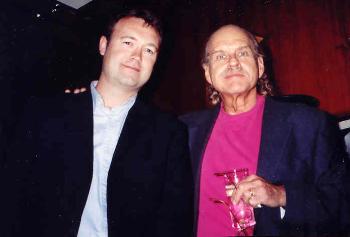
Shots Ezine organised a chat with Larry Block to really find out what makes his work so special and for this we asked long-time fan, thriller writer Simon Kernick to interrogate the Diamond Geezer.
Simon : | We read how much you appreciated being recognised by the CWA in your message on their website (www.thecwa.co.uk); have you a message for your UK readers and followers? | |
Larry : | A big thank you for the readers. As for the followers - do I really have any? You know, I felt that people were following me, Iíve tried to tell myself itís just paranoia. But. . . | |
| | |
Larry : | Very. | |
Simon : | Itís an ambitious book in terms of the number of central protagonists that you use - all of whom are very different from each other - and the way their lives collide. Did it require a great deal of forward planning? | |
Larry : | Actually, I worked it out as I went along. I donít seem to be capable of much in the way of advance planning, in fiction or in life itself. | |
Simon : | I understand that the main draft of Small Town was completed in a matter of weeks at the Ragdale Writers Colony, no mean feat considering itís one of your longest books. Do you tend to write in short but very productive blocks and have breaks from the day job in between, or do you try to write something every day? | |
Larry : | The first. | |
Simon : | Early on in Small Town, one of the characters utters the line Ďthat was the thing about New York - if you loved it, if it worked for you, it ruined you for anyplace else in the world.í Does that sum up the city to you? | |
Larry : | I donít know that any sentence could sum up New York - or London, as far as that goes. But I think the statement is true. | |
Simon : | One of Small Town's most important characters is the fiction writer, John ĎBlairí Creighton. Throughout the book we gain insights as to how his writing career developed, including how, after a number of rejections, he sold his first piece and was paid in copies. How did you start out, and were you despairing in the early days of ever becoming established? | |
Larry : | I was too young for despair. Despairís something one has to grow into. | |
Simon : | How much did you base Creighton on yourself? Do you share his views that itís becoming increasingly difficult for most new authors to earn their living from the craft? | |
Larry : | I donít think weíre much alike. But he got that one right, certainly. | |
Simon : | Whatís the earliest story you ever wrote, and how old were you? | |
Larry : | I donít remember. Late teens. | |
Simon : | You like to make use of writersí colonies when working on your books. Have you always done that, and in what ways do you feel it improves your work? | |
Larry : | Iím capable of more intense concentration and application when Iím isolated that way. | |
Simon : | Your two main series characters, Bernie the Burglar, and ex-alcoholic PI Matt Scudder, are very different personalities. Bernieís a mischievous charmer whose adventures have an almost Ďcosyí style about them, whereas Scudder is a guy whoís taken something of a battering through his life and seen far too much of New Yorkís dark heart. Which of the two would you rather have dinner with? And is one easier, or more satisfying, to write than the other? | |
Larry : | Iím afraid I donít like that kind of hypothetical question about my characters. Theyíre both satisfying to write, in different ways. | |
Simon : | In the latest Scudder, Hope to Die, you introduced an element of third person narrative for the first time in the series, allowing us to see things from the killerís point of view. In hindsight do you think it would have worked with any of the earlier books? And will you be using it again as a narrative device ? |
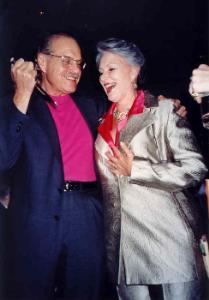
|
Larry : | Maybe. And dunno. | |
Simon : | Werenít you tempted to add Matt Scudder into the mix in Small Town? | |
Larry : | No. | |
Simon : | We havenít had a Bernie the Burglar book in a while. Apparently one is in the offing. If so, can you tell us when weíll be seeing it in the UK? And can you let us know a little about it? | |
Larry : | No Exit published The Burglar on the Prowl in March, and I probably ought to let it speak for itself. Itís not yet out in the States, pub. date is March 16, but people whoíve read it seem to like it. My chief hope is that it will add the phrase ďPardon my LatvianĒ to the language. | |
Simon : | Itís clear from the Bernie the Burglar novels that you know the tricks of the trade vis-a-vis breaking into a whole variety of supposedly secure places. Who taught you those tricks? And would you have tried your luck as a burglar if the writing hadnít worked out? | |
Larry : | Crikey, you canít expect me to answer that one, can you? | |
Simon : | The above apart, what would you have done for a living if you hadnít succeeded as a writer? | |
Larry : | No idea. | |
Simon : | Movie adaptations of your books have been made before but havenít, in my opinion, been true to your work. I do recall, however, that there has been much talk of filming A Walk among the Tombstonesí, one of my favourites in the Scudder series. Can you bring us up to date about whatís been happening with that? | |
Larry : | At the moment, after a great deal of horseshit, not a single thing is happening. | |
Simon : | Matt Scudder always has a ready supply of classy one liners that demonstrate a dry, gallows humour. Most writers, myself included, would love to be able to think up even half as many for their own characters. Where do you get them all from? And are you the sort of guy who uses them in your own conversations? | |
Larry : | No, Iím notoriously boring in person. | |
Simon : | Keller, the amiable killer-for-hire from Hitman and Hitlist, is the type of character that you canít help but like in spite of yourself. Itís a novel idea to have your main protagonist as a murderer. How did you ever think up a character like him? And how sympathetic do you find him, bearing in mind that he occasionally kills a complete innocent and doesnít appear to lose huge amounts of sleep over it? Ditto Dot, his handler? | |
Larry : | I donít lose much sleep over it either. | |
Simon : | Is Keller going to be making reappearance at some point? | |
Larry : | Iíve written a novella which will appear in a collection my friend Evan Hunter has put together, and eventually I expect itíll be the opening of the third - and very likely final - Keller novel. | |
Simon : | The vast majority of your work concerns characters living and working (or burgling!) in New York, and the events that shape their lives. Which other writers using the same backdrop, do you admire? | |
Larry : | Damon Runyon, Leonard Bishop, Jerome Weoidman, Irving Shulman, John OíHara. (I try never to say anything nice about another living writer.) | |
Simon : | Youíre a truly prolific writer. In general, how much forward planning/research do you do before embarking on a book? | |
Larry : | Precious little. | |
Simon : | The future. What does it hold for fans of Lawrence Block? | |
Larry : | Hell, I donít even know what it holds for Lawrence Block. | |
Simon : | Thanks very much for your time and patience and enjoy your visit to London. |
|
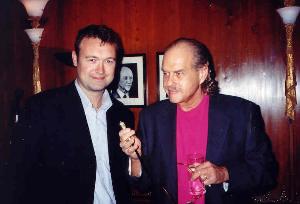
Simon Kernick is the critically-acclaimed author of three London-based crime thrillers: The Business of Dying, The Murder Exchange and, most recently, The Crime Trade. (Bantam, £12.99). His fourth novel, A Good Day to Die, is due for release in June 2005.
More information on the works of Lawrence Block is available from :-
More information on the works of Simon Kernick is available from :-
Shots Ezine would like to thank Larry Block, Simon Kernick and Maggie Griffin for this article.
If you want to see the photographs of when Larry visited London for the award of the Diamond Dagger, click here :-
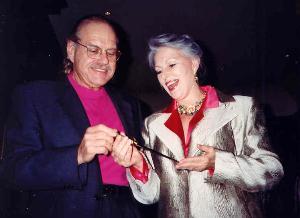
Photographs © 2004 Ali Karim and Mike Stotter

| Webmaster: Tony 'Grog' Roberts [Contact] |